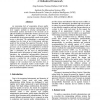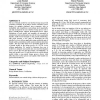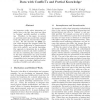396 search results - page 44 / 80 » How scientific models can explain |
HICSS
2008
IEEE
14 years 2 months ago
2008
IEEE
An increasing level of cooperation between public administrations nowadays on national, regional and local level requires methods to develop interoperable EGovernment systems and ...
UM
2007
Springer
14 years 1 months ago
2007
Springer
: SimStudent is a machine-learning agent that learns cognitive skills by demonstration. It was originally developed as a building block of the Cognitive Tutor Authoring Tools (CTAT...
BCSHCI
2007
13 years 9 months ago
2007
The use of formal models for user interface design can provide a number of benefits. It can help to ensure consistency across designs for multiple platforms, prove properties such...
CLEANDB
2006
ACM
13 years 9 months ago
2006
ACM
An important reality when integrating scientific data is the fact that data may often be "missing", partially specified, or conflicting. Therefore, in this paper, we pre...
COMMA
2008
13 years 9 months ago
2008
Abstract. Much work using argumnentation frameworks treats arguments as enbstract, related by a uniform attack relation which always succeeds unless the attacker can itself be defe...



